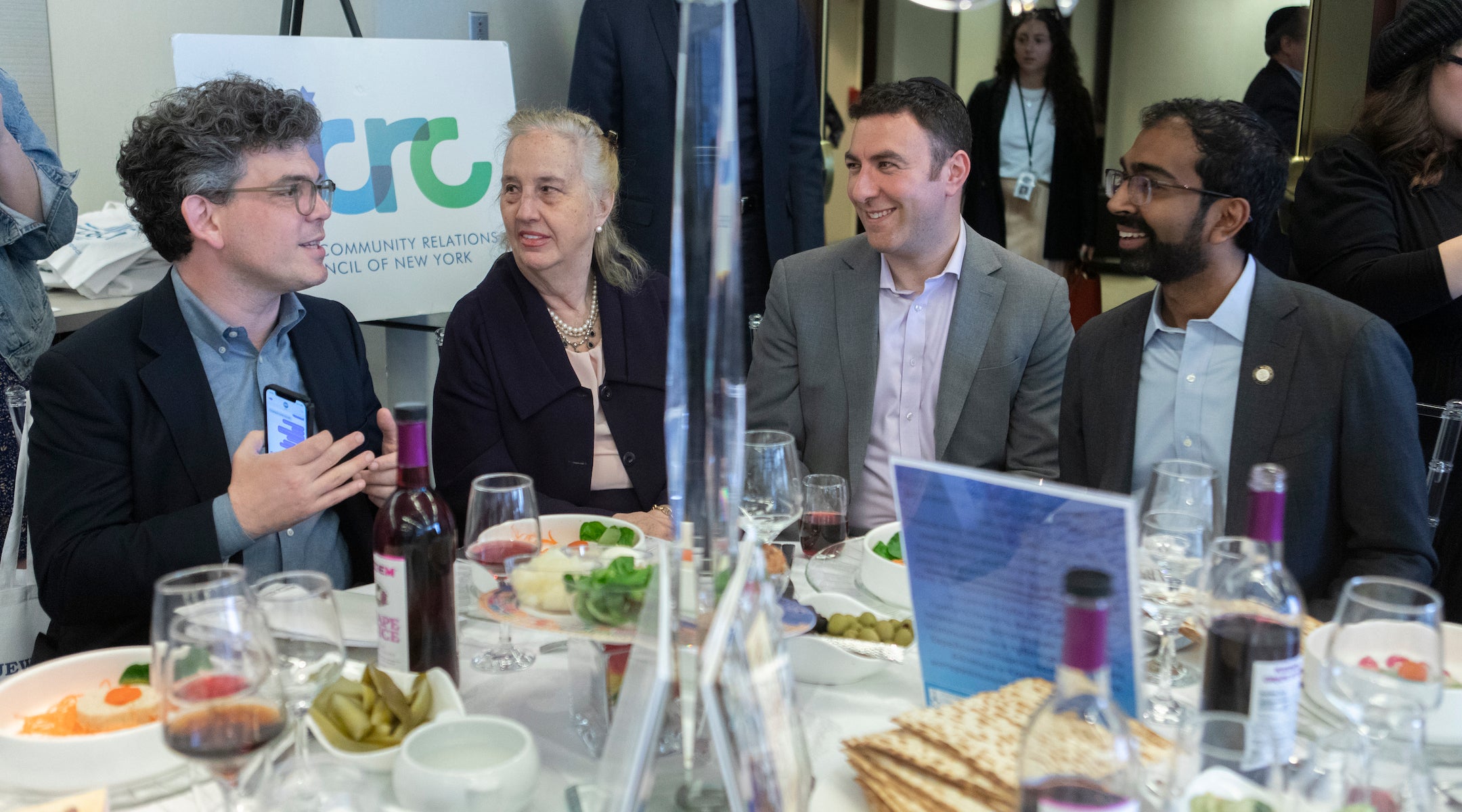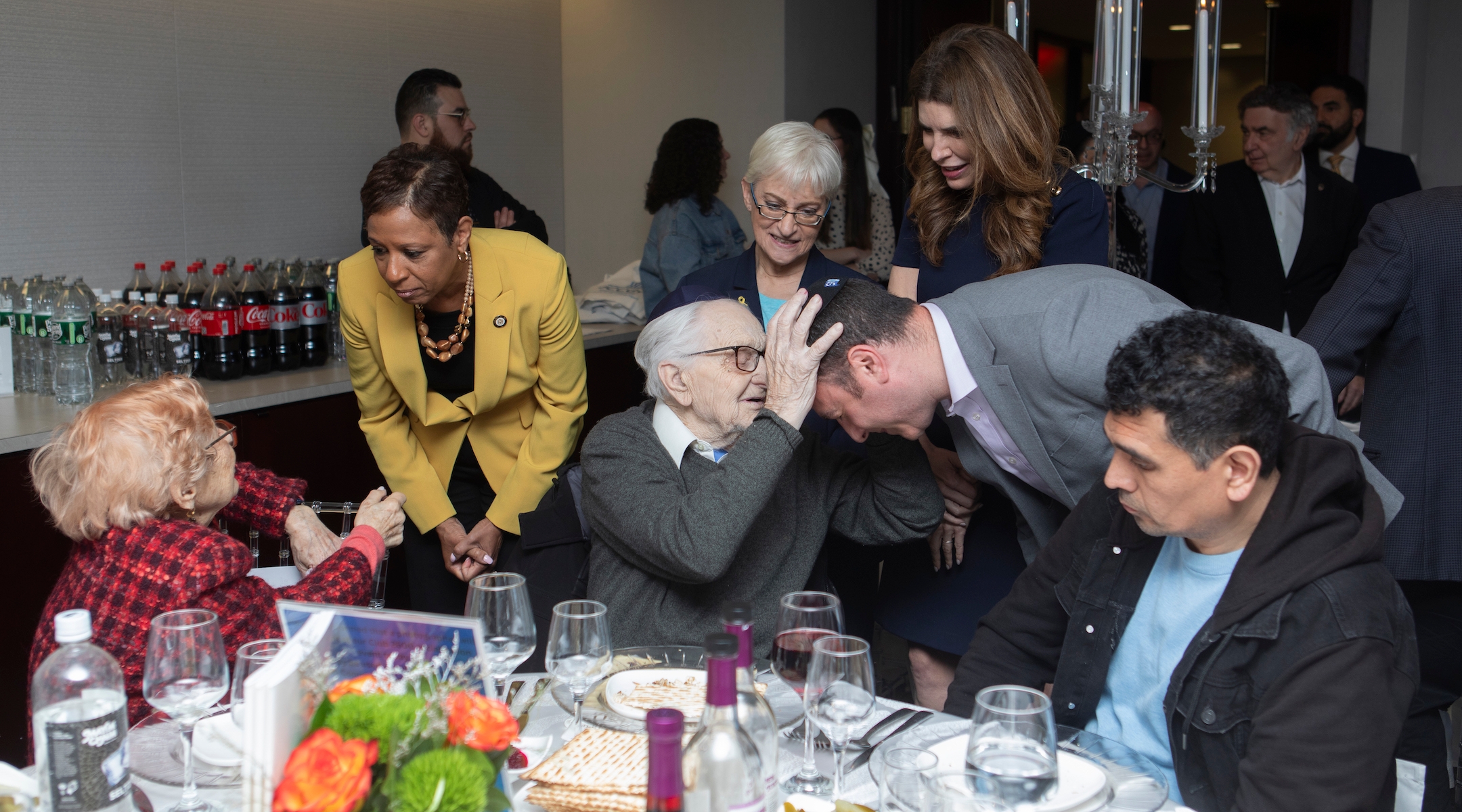(New York Jewish Week) — Jacob and Hedy Weiss have celebrated the last 75 Passovers together — ever since they met in Israel after surviving the Holocaust.
As one might expect, the Hungarian-born couple have their routine down to a science. This week, they’ll spend time cleaning out their Brooklyn apartment of chametz, or leavened products. Next week, they’ll join their daughter at her Manhattan apartment for a seder alongside their grandchildren and great-grandson.
But the Weisses also made time for something new this year: On Monday, the couple joined approximately 70 other Holocaust survivors and a crowd of elected officials in Manhattan for a model seder — an abridged, ceremonial version of the Passover seders that will take place in Jewish households across the world on April 22 and 23 this year.
“I thought I was too tired to come, but over the weekend, I turned on the news in Israel and have not slept in two days,” Hedy Weiss, 92, told the New York Jewish Week, referring to Iran’s attack on Israel on Saturday. “It felt important to come to be with other Jewish people and younger people,” nodding to politicians who ranged in age from their 30s to their 60s.
At a time of heightened tension over the Israel-Hamas war, the seder was designed to transcend politics and show solidarity among local politicians, Jewish groups and some of New York City’s approximately 14,700 remaining Holocaust survivors ahead of the eight-day festival.
“The whole idea was to expose these council members of different faiths directly with Holocaust survivors, and bring the message of Passover as a unifying theme to all of them,” Howard Pollack, the director of community affairs at Jewish Community Relations Council, which co-sponsored the event, told the New York Jewish Week.
The politicians attending included City Council Speaker Adrienne Adams, 63, along with Democratic Council members Lincoln Restler of Brooklyn and Shekar Krishnan of Queens, Republican Inna Vernikov, whose district covers Brighton Beach and other parts of Southern Brooklyn, and several others. The event was organized by the JCRC, a main liaison between elected officials and the organized Jewish community, and the Jewish Community Center of Greater Coney Island, one of the largest social services agencies for Holocaust survivors in the city.
“There’s something very special about survivors — their story of redemption and what they overcame, to some degree mirrors the story of Passover and the story of the Jewish people,” said Manhattan Democrat Eric Dinowitz, 38, who chairs the City Council’s Jewish Caucus and was a main organizer of the model seder. “It’s incredible to have so many survivors here and to have so many Jewish and non-Jewish members of the city council who want to support and learn and experience the seder.”
At Monday’s lunchtime seder — which took place in an event space near Battery Park in Lower Manhattan, with views looking out into the New York Harbor and the Statue of Liberty — Speaker Adams, like Hedy Weiss, took a moment to acknowledge the weekend’s events, when Israel and its allies intercepted hundreds of Iranian drones and rockets aimed at Israeli targets.
“I do want to take a moment to express my profound sadness about the continued violence over the weekend with Iran’s attack on Israel, as well as all ongoing violence in the region that leaves people less safe,” she said. “We want to see an end to violence and we want to continue to pray for peace, safety and stability for everyone in the entire region.”
Adams centered her speech on the meaning of Passover and the importance of honoring one’s ancestors and history, as well as the imperative of building solidarity between different groups of New Yorkers.
“To know ourselves, we need to know where we come from — our ancestors and their struggles and resilience shaped who we are today. Passover provides us the opportunity to reflect on our history and instill these lessons in our children,” Adams said.
“This education is crucial and it’s how we equip our children to build a brighter and more just future,” she continued. “We must not repeat the mistakes and tragedies of our past. It is all upon us to stand up for each other and protect each other because we’re connected through our common humanity.”
As guests dined on traditional seder fixings — matzah, gefilte fish, horseradish, hard-boiled eggs, chicken soup and brisket — elected officials presented various sections of the seder, and shared their thoughts on the holiday.
Council member Julie Menin, a Democrat whose district covers the Upper East Side, shared that her grandmother and mother survived the Holocaust before immigrating to New York City. Vernikov briefly addressed the crowd of survivors in Russian — the mother tongue of many in the room. Both women drew parallels between the redemption story of Passover and the redemption they and their families found coming to New York.
“It’s very personal for me to be here, as my mother and grandmother came to New York from Hungary after surviving the Holocaust,” Menin said. “Survivors embody strength, resilience and hope.”
Other Council members present included Gale Brewer, Lynn Schulman and Erik Bottcher.

New York City Council members particpate in a model seder, April 15, 2024. (Emil Cohen/NYC Council Media Unit)
Many of the survivors in the room delighted in singing seder classics like “Dayenu,” “L’Shana Haba B’ Yerushalayim” and “Echad Mi Yodea.” The singing was led by Hasidic musician Eli Marcus.
The group also heard from Mark Treyger, who took over as CEO of the JCRC in March after serving as the City Council representative of District 47 in Southern Brooklyn from 2014-2021.
“We’re gathered at a very important time in our history, and present day. Our hearts are heavy. But we remain inspired, and strong in the face of challenge and uncertainty… I recognize the moment that we’re in. But I also see in the audience today, so many Holocaust survivors and their families and friends and you are a source of strength and inspiration for us all,” he said.
Indeed, Hedy and Jacob Weiss were too busy dancing, singing “Yerushalayim Shel Zahav” and making the traditional Hillel sandwich of matzah and maror to answer any more questions from a reporter.
“I enjoy this so much,” said another survivor named Elzbieta, who declined to provide her last name. “It’s so beautiful.”
Adams, meanwhile, said she hoped the event would become an annual one. “We are here today, of course, to show our solidarity with you,” she said. “As a council, we remain united in uplifting our Jewish communities and we stand together against all forms of hate, including antisemitism.”
The New York Jewish Week brings you the stories behind the headlines, keeping you connected to Jewish life in New York. Help sustain the reporting you trust by donating today.





